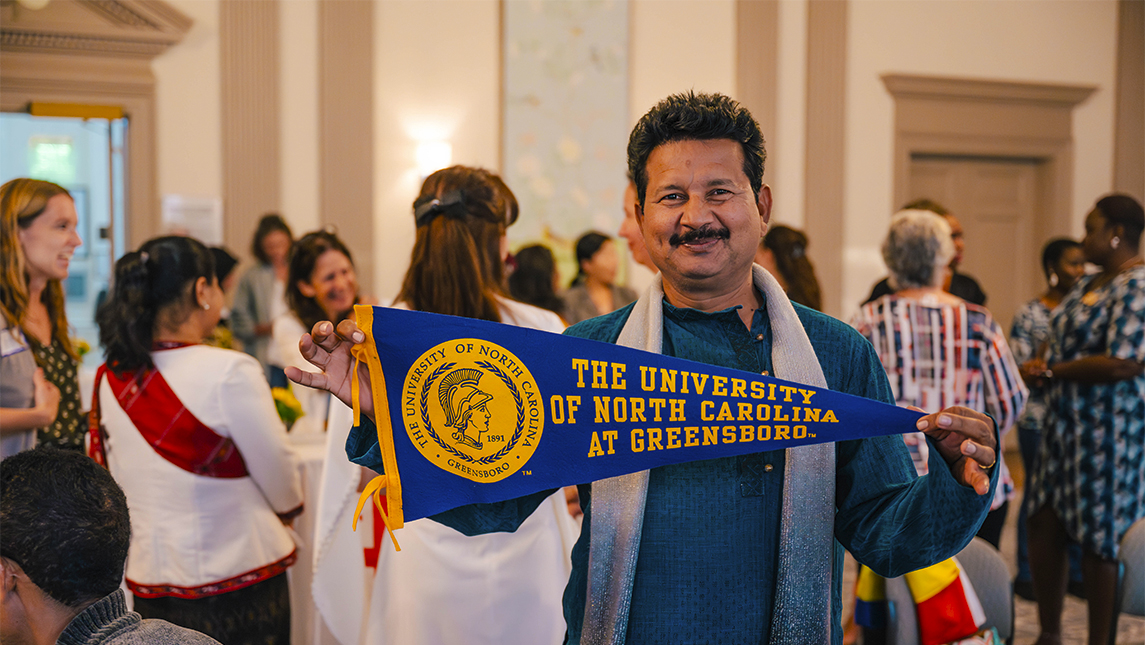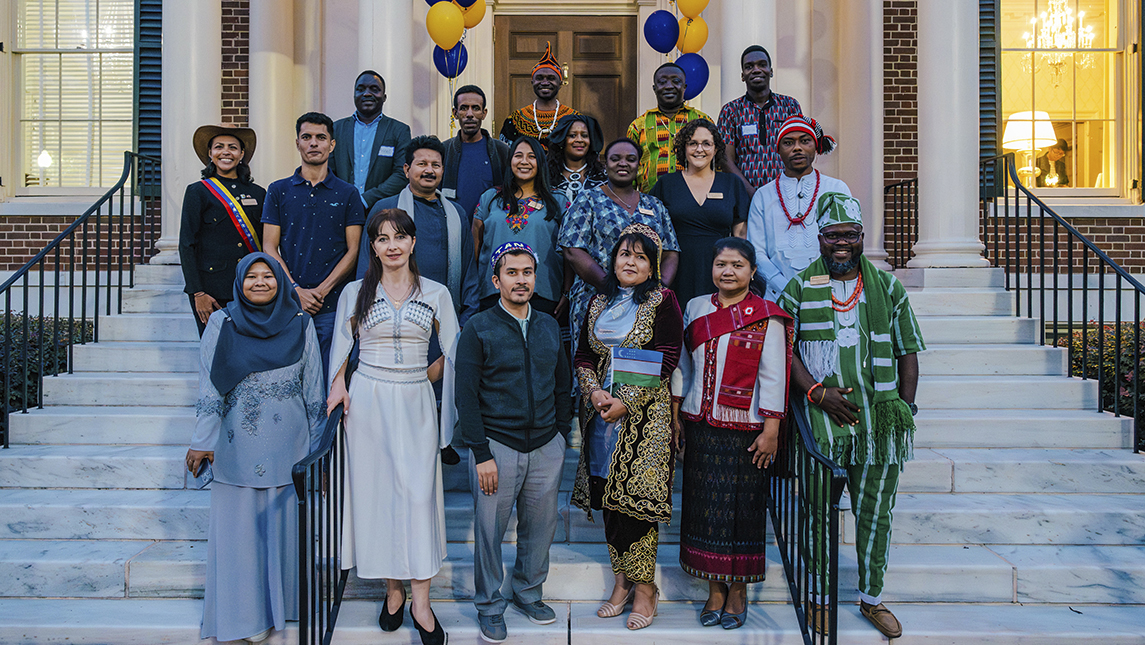UNCG hosts Fulbright TEA Scholars from 21 countries across the world
What makes a classroom work? How can you engage students through play and technology? How does culture play a role in learning? This year’s cohort in the Fulbright Teaching Excellence and Achievement (Fulbright TEA) Program came to UNC Greensboro to discover answers to these questions and more over their six-week residency. Fulbright TEA is a U.S. government program supported by the Bureau of Educational and Cultural Affairs of the United States Department of State, and administered by the International Research and Exchanges Board.
“The Fulbright TEA Program helps us bring the world to UNCG, and provides life-changing opportunities to the Fulbright Scholars, our faculty, and students on campus,” says Maria Anastasiou, program director and associate provost for International Programs. “Hosting these teachers is our honor and privilege.”
Inside United States classrooms
As part of the program, participants spent a week or more inside local schools including The Middle College at UNCG, Western High School, Doris Newcomers Schools, and other Guilford County Schools. The Fulbright TEA Scholars shadowed teachers and administrators, learning the differences and similarities in their teaching practices and policies.
“The opportunity to be immersed in U.S culture and partnering with a U.S. teacher within a classroom is an honor and privilege that all educators should seek,” says Keisha Russell-Graves from Barbados. “The exchange of ideas and the ability to foster a deeper appreciation for cultural differences are a few reasons why being a part of this program was a necessity.”
“I learned a great deal from my immersion in Guilford County Schools,” says Estela Quintana, a Fulbright TEA Scholar from Uruguay. “I’ve gained a profound appreciation for the care and commitment that teachers demonstrate toward their students. They consistently make an effort to ensure that every student feels included and exhibits a true passion for their work. Through my interactions with students, I’ve been able to share my experiences and, in turn, witness their respect for others, their empathy for global issues, and their curiosity about how people from diverse backgrounds live and handle their daily lives.”
Exchange of ideas on campus
The Fulbright TEA Scholars were immersed in learning sessions on campus with UNCG faculty from across departments. Sessions focused on philosophy of education, new methods for providing feedback to students and its importance, co-teaching, designing engaging classroom materials, instructional coaching, and more.
“Omar Ali, dean of the Lloyd International Honors College gave a session that taught me the importance role play has in the learning process,” Russell-Graves says. “In this session we engaged in many playful, fun activities which assisted with our learning as adult learners. This was an eye-opening experience because play was still a very important element even for us as adults. The conclusion for me is that play is critical at all levels of the teaching and learning process.”
In addition, the scholars were introduced to Teacher Education Fellows (TEF) from UNCG’s School of Education and exchanged insight on their paths to becoming educators. In early October, the Fellows and the Fulbright TEA scholars were able to learn how culture impacts teaching practices, giving the TEF cohort a glimpse into the culture of classrooms outside of the U.S.
“It’s all about perspective and understanding various different cultures in education,” says Debra Holzberg, clinical assistant professor in the Department of Specialized Education Services and director of the TEF program. “Part of it is realizing that we’re more alike than we are different. That we really have so much in common. In this case as educators, we are committed to the education of students and to access to education.”
Holzberg polled the 23 TEF students who worked with the Fulbright Scholars and shared their anonymous responses.
“I learned a lot about education in the U.S. and education globally through this event with the Fulbright TEA Scholars,” remarked a Teacher Education Fellow. “I learned that I earn more as a substitute than teachers make in a day in India. I think it’s extremely important to know where you come from and be proud of it, but also know that there are things around the world bigger than the town of Greensboro or even the grand scheme of the U.S.”
“This experience has really opened my eyes to how much privilege we have in the United States,” said another fellow. “Many of the teachers were telling me about the little resources they have and that there are usually 30 to 50 students in their classroom each year.”
Students on campus benefited from learning what real-world classroom experiences are like for teachers in different corners of the world – both what’s the same and different.
“The exchange with the FulbrightTEA Scholars helped our fellows build perspective and reminds us that though we have our own realities and our own experiences, we can get a lot done if we work together,” Holzberg says.
New experiences, new perspectives
As the Fulbright TEA cohort returns to their schools and communities around the world, they will take this experience and new perspectives with them.
“My perspective on teaching has really changed. Teaching should be inclusive with regard to universal design learning that makes lessons accessible for all students,” says Frashakin Olusegun from Nigeria. “Co-teaching is a strategy that should find popularity in my country. Technology-integrated learning may save time and stress as the application of the right tools in teaching can’t be overlooked.”
“Learning from my colleagues’ experiences around the world has underscored the importance of emphasizing global issues such as environmental awareness, empathy, effective communication, and global citizenship in my teaching,” says Estala Quintana from Uruguay. “I believe these aspects are critical for my students’ development and their future lives.”
This Fulbright TEA Scholars were funded in part by a grant from the United States Department of State. The opinions, findings and conclusions stated herein are those of the author and do not necessarily reflect those of the United States Department of State.
Story by Alice Manning Touchette
Photography by Sean Norona, University Communications

MEET INTERNATIONAL STUDENTS AND SCHOLARS AT UNCG



